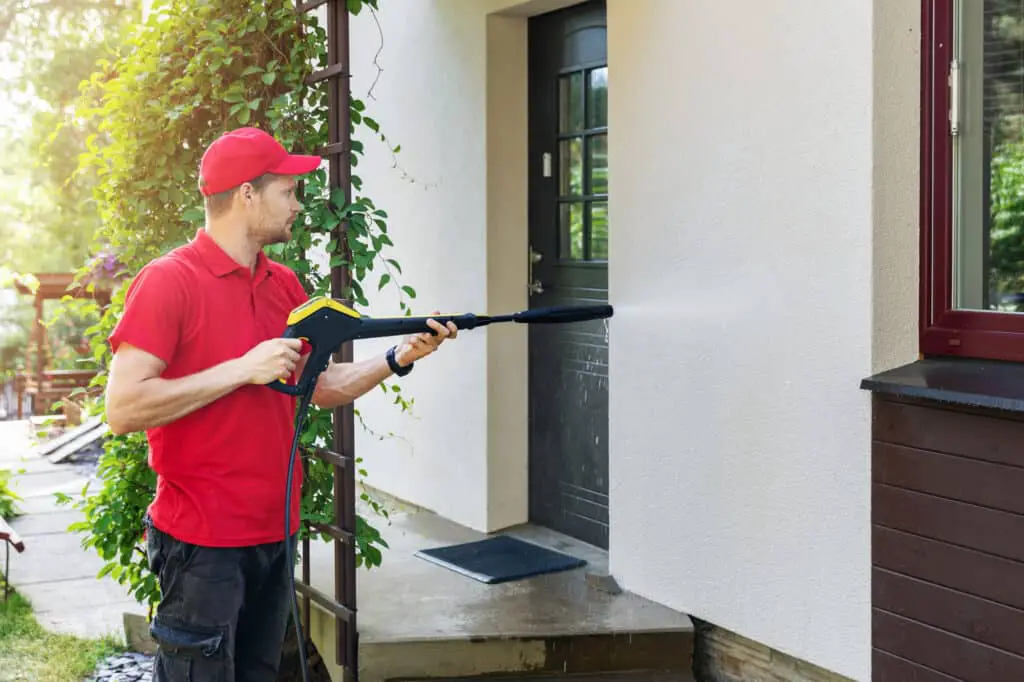If you pressure wash your house you will yield amazing results, but it’s important to remember that you should only do a full house wash once every year.
However, if you encounter special circumstances where a specific area has gotten dirty, you can wash that area as and when you need to.
One often-overlooked use for a pressure washer is to clean the exterior of your house.
Although it is probably the biggest asset we own, you would be surprised how many people don’t realize that they can pressure wash their own house.
But how often should you pressure wash your house?
In this article, we will explore what you need to know before, during, and after pressure washing your house.

Table of Contents
Is It Bad to Pressure Wash Your House?
If pressure washing is not done correctly, it could cause damage to your home, as well as other common surfaces like concrete or wood decks.
I wrote these two articles about damaging concrete and decking when you pressure wash your house.
When you pressure wash your house, it’s important to be careful not to damage or remove plastics, paint, or other fragile materials.
The main function of a pressure washer is to create immense pressure and push water through a small hole at the end of the hose, which can cut through certain materials.
To avoid damaging your property, you should stand at a distance that allows the water jet to lose some of that initial pressure.
If you have particular areas that are brittle, power washing should be avoided.
Most pressure washers have a mist function that can be used on fragile areas by turning the nozzle.
I have this related article with a guide to affordable pressure washers if you think it will be helpful.
Which Cleaning Agents to Use on My House Before Pressure Washing
For the first wash, it is recommended to use a mixture of bleach and mildewcide.
Consult your model’s manual for the appropriate mixture.
As a general rule, use one part bleach for every nine parts detergent.
If you have plants or bushes near your property, protect them from back spray or overspray.
Use plastic sheeting and duct tape or tie-wraps.
When You Should Not Pressure Wash Your House
If your home has any form of siding with pebbles or rocks, you should avoid using a pressure washer as it can dislodge the siding even at low psi.
You should avoid using a pressure washer on hardwood surfaces as the high-pressure water can cause severe structural damage by penetrating the wood.
Always ensure to apply the correct amount of pressure on different surfaces and materials.
Related Articles:
- Choosing the Best Pressure Washer PSI: Maximize Your Cleaning Power
- What Size Pressure Washer To Clean Concrete
What Time of Year Is Best to Pressure Wash Your House?
Typically, it would be best if you powered wash your house between March and November.
If you live in a hot or cold climate, you may need to adjust this, but for the sake of this article, we will concentrate on the average weather cycles.
The winter can be bad for pressure washing because of the added hazards, ice forming, pressure washer failures, and underperforming detergent.
Not to mention that pressure washing in the winter seems a little counter-productive due to the actual weather.
Taking into account the factors involved, you should pressure wash your house in the spring or summer.
This will help to overcome some major obstacles and also allow the property to dry more quickly.
Perfect Weather Condition to Pressure Wash Your House
Pressure washing your home doesn’t need to be done in sunny conditions.
In fact, it can be more difficult in bright sunlight with no clouds in the sky.
It becomes difficult to see marks and streaks, and the water can dry quite quickly, leaving unsightly marks on windows and plastics.
The best time to pressure wash your house is on an overcast day, the diffused sunlight helps find dirty marks and streaks.
You should never perform any pressure washing during a thunderstorm; the large pressure washer hose is an excellent conductor for lightning.
Related Article: In What Circumstances Should I Not Pressure Wash My House?
Pressure Washing Safety Steps
- Before using a pressure washer, it’s crucial to wear eye protection to prevent injuries such as damage to the eyes from high-pressure water, projectiles, and grit.
- Ensure that the area you are working on is free of any trip hazards and that people and pets are aware that you are pressure washing.
- Pressure washers run on electricity, due to the fact you are using water you need to make sure that all sockets and covered and waterproofed.
- Do not use a ladder while pressure washing. You need a firm stance to handle the back pressure from the hose.
- Always read the user manual supplied with your pressure washer.
- After you have finished using your pressure washer, you should ensure the hose is clean and serviced and the unit is stored in a dry place.
- All detergents and bleach should be stored in an area that is hard to reach or locked away so children can’t get hold of them.
Related Reading: 11 Crucial Pressure Washer Safety Tips You Must Follow: Blast with Care
Final Thoughts
Using a high-pressure water jet for pressure washing can quickly remove grime, mildew, and dirt that would take much longer to scrub by hand.
You can access areas of your home that would typically be out of reach without a ladder.
It is not recommended to pressure wash your home’s exterior if it is made of any of the materials mentioned in this article.
Before using a pressure washer, it’s important to take great care and prepare adequately, especially when you pressure wash your house.
Professional companies can perform the work for you. They are insured against damage, loss, and injury.
If you’re not comfortable pressure washing your own home, consider hiring a professional company for the job.
I truly enjoy pressure washing my home, patios, and walkways.
You get immediate gratification from seeing your house transform before your eyes.
Be careful!!!
Enjoy living the outdoor life!!!
